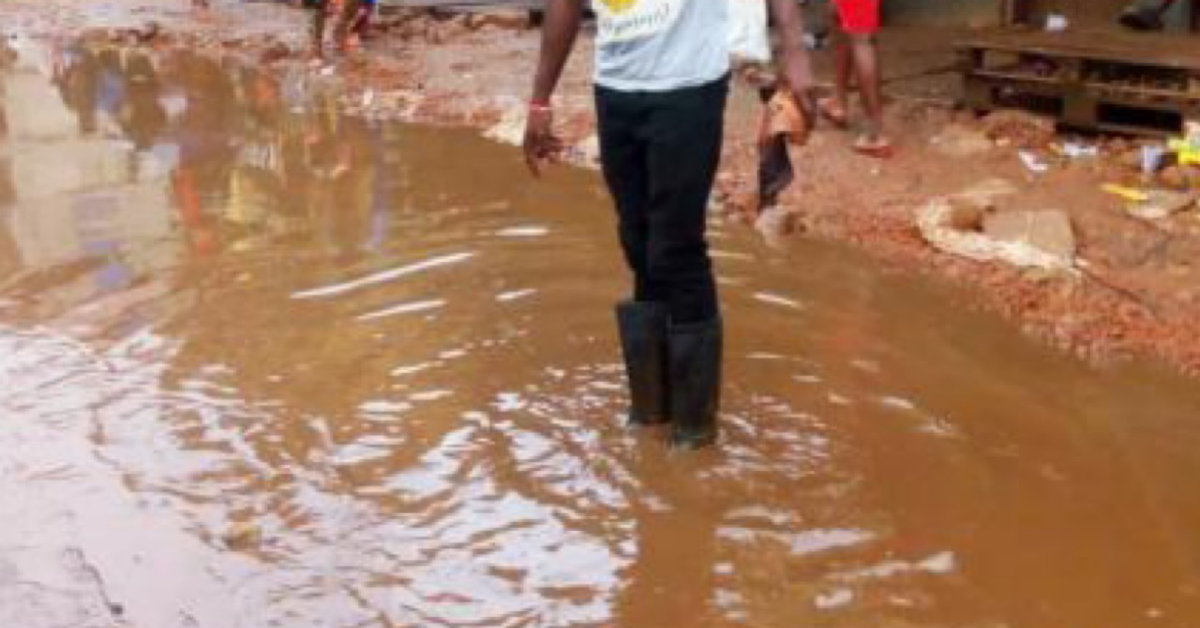Residents, drivers, and business owners in Freetown, Sierra Leone, are embroiled in mounting distress as the condition of the critical Fourah Bay Road worsens. The thoroughfare, a vital artery in the city, has become a hotbed of grievances due to the proliferation of potholes, with a cascade of concerns pouring in from affected individuals.
Sierraloaded conducted interviews with various stakeholders, including drivers, residents, and business owners, who collectively expressed their distress over the deplorable state of Fourah Bay road. Their concerns centered on the detrimental impact the road’s deterioration has had on their daily lives and businesses. Most notably, they urgently appealed to the government to address the road’s dire condition, emphasizing its crucial role as a primary thoroughfare in Freetown, Sierra Leone.
Throughout these interviews, drivers highlighted the challenges they face navigating the damaged road, affecting both transportation efficiency and vehicle maintenance costs. Residents emphasized the adverse effects on their daily commute, safety concerns, and overall quality of life. Business owners voiced their struggles with decreased customer accessibility and increased operational costs due to the road’s poor state.
The collective plea from these individuals underscores the critical need for immediate government intervention to initiate comprehensive maintenance and repair efforts on the Fourah Bay road. Such actions are essential to not only alleviate the current hardships experienced by the community but also to sustain the vital connectivity and functionality of this significant roadway in Sierra Leone’s capital city.
In an interview with Mr. Musa Kamara, a distressed Keke driver, he expressed the daily woes endured by drivers navigating the crumbling road. He emphasized, “The continuous deterioration of the road is taking a toll on our vehicles, causing frequent damages and escalating maintenance costs. We kindly request the support of the Minister of Works, Minister of Transportation, and Aviation to assist us in the upkeep of this primary road. The trucks from the Sea Port, known as Water Quay, significantly contribute to the deterioration of Fourah Bay Road. Thus, the government must tackle this concern by constructing a durable, long-lasting road infrastructure.”
Mrs. Isatu Swaray, a resident residing along Fourah Bay Road, highlighted the escalating crisis, particularly focusing on the stretch between the Cottage Hospital and Eastern Police Station. She bemoaned the profusion of potholes brimming with stagnant, malodorous water.
Mrs. Swaray remarked, “The dire situation has not only disrupted daily commutes but has also catalyzed an unforeseen menace, as the stagnant water acts as a breeding ground for mosquitoes, encroaching upon residents’ homes. Moreover, the inundation impedes access to some houses, exacerbating the hardship faced by the locals.”
Mr. Abu Sesay, a concerned business owner operating along Fourah Bay Road, resonated with the growing disquiet, shedding light on how the dilapidated road poses a significant hindrance to customer access to their shops and businesses.
Abu Sesay plea for immediate government intervention stems from the pivotal role Fourah Bay Road plays in the city’s transportation network. Being one of the principal routes into Freetown, the deterioration of this road not only impacts residents but also deters visitors, compounding the already dire situation.
The road’s degradation isn’t isolated solely to Fourah Bay Road, as Mr. Sesay also noted the lamentable condition of Kissy Road, riddled with potholes, further aggravating the city’s traffic and transit woes.
The overarching concern revolves around the deteriorating quality of life, safety hazards, economic setbacks, and the compromised mobility of residents and businesses along these essential routes. The pressing need for infrastructural repair and maintenance is underscored by the detrimental impact on commerce, public health, and overall quality of life in the area.
Acknowledging the dire circumstances and the widespread outcry from affected stakeholders, urgent government intervention and a strategic, comprehensive approach to rehabilitate and maintain these crucial roads are imperative.
Remedial actions, including resurfacing, drainage systems, and proper maintenance, are vital to mitigate the perilous conditions and alleviate the hardships faced by those residing and operating in these areas.
Efforts to address these road-related challenges should be prioritized not only to restore functionality but to bolster economic activity, enhance public safety, and ensure a higher standard of living for the residents of Freetown.
The voices echoing from Fourah Bay Road and Kissy Road are a resonating call to action, imploring authorities to swiftly intervene and restore these vital arteries to their former state, ensuring a smoother, safer, and more conducive passage for all.




 1 Comment
1 Comment










What area/part of Fourah bay Rd is shown in this picture???????